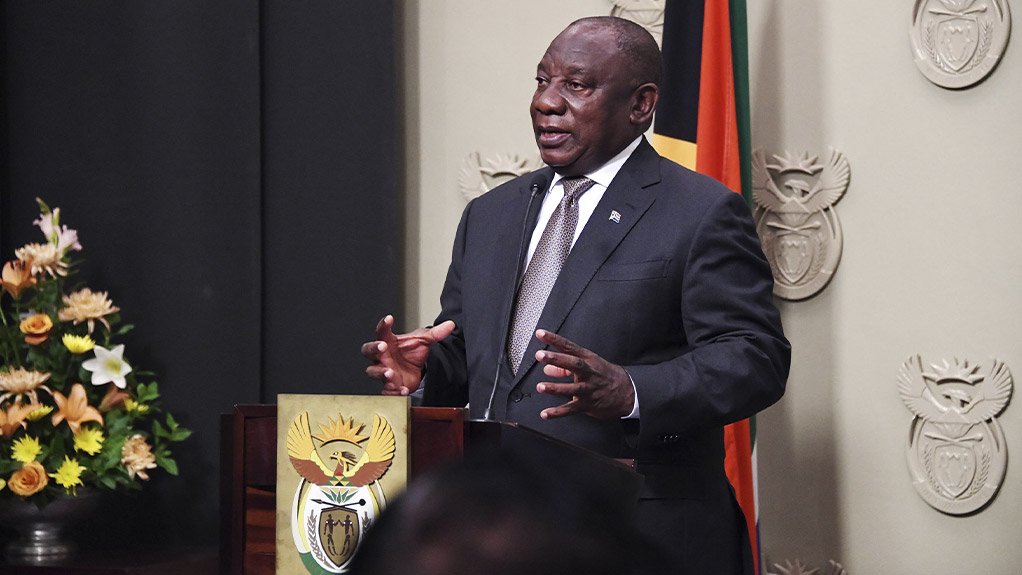/ MEDIA STATEMENT / The content on this page is not written by Polity.org.za, but is supplied by third parties. This content does not constitute news reporting by Polity.org.za.
President Cyril Ramaphosa has signed into law legislation that will improve the safety of navigation in South Africa’s territorial waters; professionalise the country’s diplomatic Foreign Service, and give citizens access to information about funding for political parties.
The Hydrographic Act provides for the establishment of the Hydrographic Office as a unit within the South African Navy, with responsibility for the safety of navigation in South Africa’s exclusive economic zone and the internal waters of the Republic.
The Office will ensure that hydrographic surveying is done in accordance with international specifications and will issue sailing directions, notices to mariners and nautical publications, in addition to other services. This is vital for the safe use and economic management of the marine resources along South Africa’s 3 000km coastline, which is at the centre of an important global shipping route.
The Act emanated from the need to recognise and grant legislative status to the Office of the Hydrographer which has been in existence within the South African Navy since 21 July 1954. This flows as well from the Defence Review of 2014 which recommended that South Africa’s international hydrographic and nautical charting obligations, responsibilities and liabilities be formalised in law.
Hydrography is a branch of applied sciences which deals with the measurement and description of the physical features of oceans, seas, coastal areas, lakes and rivers, as well as the prediction of their change over time, for the primary purpose of safety of navigation and in support of all other maritime activities, including economic development, security and defence, scientific research, and environmental protection.
The Foreign Service Act provides for the administration, accountability, and functioning of a professional Foreign Service of the Republic of South Africa that will be managed by the Department of International Relations and Cooperation.
The legislation governs the operational requirements that are suitable and supportive of the operations of the Foreign Service in a global environment. The Foreign Service is tasked with promoting and advancing South Africa’s international relations and cooperation by representing the Republic in an effective, coherent and comprehensive manner abroad.
The Act creates an enabling administrative and management framework through which the Foreign Service will be managed and regulated in a consolidated and coherent manner by the Department of International Relations and Cooperation.
At present the management of officials from various departments serving abroad is fragmented, not consistent and in many cases not optimal. The new legislation outlines government’s intent to address these concerns.
Among other provisions, the law provides for the minimum requirements a person must meet to qualify for transfer to a South African Mission. It also regulates the appointment of Heads of Mission and the requirements that such persons should have in order to be appointed.
The Act deals with the recall of members of the Foreign Service and provides that a member of the Foreign Service who commits any act outside the Republic that constitutes misconduct, will be prosecuted in South Africa as if the offence had been committed inside the country.
The Promotion of Access to Information Amendment Act (PAIA) provides for the recording, preservation and disclosure of information on the private funding of political parties and independent candidates.
The Bill gives effect to the Constitutional Court judgment in My Vote Counts NPC v Minister of Justice and Correctional Services and Another [2018] ZACC 18 which required Parliament to amend PAIA and to take any other measure it deems appropriate to provide for the recordal, preservation and facilitation of reasonable access to information on the private funding of political parties and independent candidates.
The Child Justice Amendment Act provides for an increase of the minimum age of criminal capacity of a child 10 to 12 years.
It also repeals the requirement to prove criminal capacity for the purpose of diversion and preliminary inquiries. This legislative change arises from a recommendation in the Report on the Review of the Minimum Age of Criminal Capacity that the minimum age of criminal capacity should be increased from 10 years to 12 years.
The Report further recommended that the provisions in the Act which require the State to prove the criminal capacity of a child who is 10 years or older but under the age of 14 years for purpose of diversion and preliminary inquiries should be removed.
The Independent Police Investigative Directorate Amendment Act provides for parliamentary oversight in relation to the suspension, discipline or removal of the Executive Director of IPID.
The Directorate is mandated to investigate serious criminal offences allegedly committed by members of the South African Police Service (SAPS) and Municipal Police Services (MPS). The new amendment gives effect to the Constitutional Court judgment in McBride v Minister of Police and Another [2016] ZACC 30.
The Constitutional Court declared as invalid certain provisions of the Independent Police Investigative Directorate Act that authorised the Minister of Police to suspend the Executive Director, to take disciplinary steps against the Executive Director following suspension, and to remove the Executive Director from office.
The Constitutional Court then ordered Parliament to address the defects in the legislation.
Issued by the Presidency
EMAIL THIS ARTICLE SAVE THIS ARTICLE ARTICLE ENQUIRY
To subscribe email subscriptions@creamermedia.co.za or click here
To advertise email advertising@creamermedia.co.za or click here











